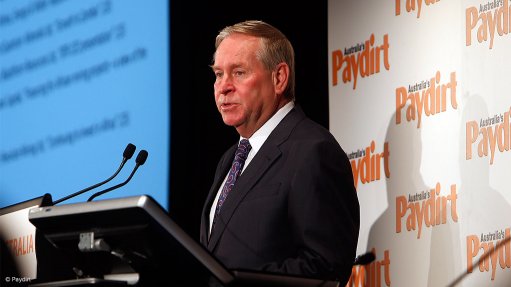
Premier Colin Barnett
PERTH (miningweekly.com) – West Australian Premier Colin Barnett on Wednesday voiced optimism over the future of commodity prices, expressing the view that, while the market was still fragile, commodity prices had likely “hit the bottom”.
“Oil, gas and iron-ore prices are low, but we have probably hit the bottom [of this cycle]. The next 12 months will be a period of risk, but I think by the next Africa Downunder there will be more optimism and we will likely see better demand and stronger growth,” he told delegates attending the first day of the Africa Downunder conference, in Perth.
The Premier noted that while several spectators were cynical about the future of the Australian mining industry, the industry was a cyclical one, which meant that prices were likely to rise.
“Just as prices go down, they will stabilise and rise again. Nothing has changed,” Barnett said.
He applauded the resilience of the Western Australian mining sector, which had proved resilient in the most recent downturn in commodity prices, by cutting costs to ensure global competitiveness.
“Maybe the industry got a little fat in the good times, but most have been able to trim down costs and the net result is that while prices are low, the costs here are competitive. And that means that our miners will emerge more lean and competitive [when prices increase].”
Barnett further noted that the Western Australian resources sector was prime for investment, given that the Australian dollar was trading lower against the greenback and that construction costs had gone down by nearly 30%, compared with prices achieved at the height of the commodity cycle.
The Australian resources sector was currently worth some A$175-billion, with the Western Australian sector accounting for A$114-billion of that value. The state accounted for nearly 30% of the world’s total iron-ore production and some 12% of the world’s nickel and alumina production.
While the state only had around 10% of Australia’s total population, it accounted for nearly 50% of the country’s exports.
Barnett noted that, over the last decade, Western Australia’s resources industry has matured, with iron-ore production set to double while liquefied natural gas production would treble by the end of 2020, from projects already invested in.
“There will be new projects and future growth, but we will never achieve the scale of growth that we have recorded in this decade,” the Premier said.
Instead, he expected that the expansion of major commodity markets would likely come from African nations.
"With our long history of responsible resources development, Western Australia is well placed to assist African countries to develop transparent, stable and mutually beneficial regulations for their resources sector," Barnett said.
In January 2014, the Western Australian government inked a memorandum of understanding with the Common Market for Eastern and Southern Africa that would allow the state to provide assistance in developing regulations and legislation.
“It is early days yet, but I’m pleased with the way the agreement is progressing,” Barnett said on Wednesday.